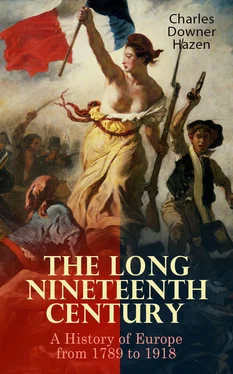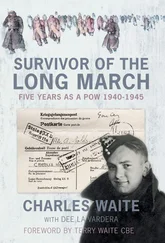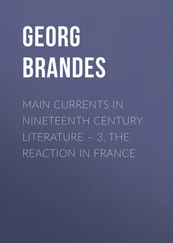In Italy, on the other hand, it was to find, partly a receptive pupil, partly an easy prey. The most important thing about Italy was that it was unimportant. Indeed there was no Italy, no united, single country, but only a collection of petty states, generally backward in their political and economic development. Once masters in their own house, the Italians had long ago fallen from their high estate and had for centuries been in more or less subjection to foreigners, to Spaniards, to Austrians, sometimes to the French. This had reacted unfavorably upon their characters, and had made them timid, time-serving, self-indulgent, pessimistic. They had no great attachment to their governments, save possibly in Piedmont and in the republics of Venice and Genoa, and there was no reason why they should have. Several of the governments were importations from abroad, or rather impositions, which had never struck root in the minds or interests of the people. The political atmosphere was one of indifference, weariness, disillusionment. However, toward the end of the eighteenth century there were signs of an awakening. The Italians could never long be unmindful of the glories of their past. They had their haunting traditions which would never allow them to forget or renounce their rights, however oppressed they might be. They were a people of imagination and of fire, though they long appeared to foreigners quite the reverse, as in fact the very stuff of which willing slaves are made, a view which was seriously erroneous. It cannot be said that there was in the eighteenth century any movement aiming at making Italy a nation, but there were poets and historians who flashed out, now and then, with some patriotic phrase or figure that revealed vividly a shining goal on the distant horizon toward which all Italians ought to press. "The day will come," said Alfieri, "when the Italians will be born again, audacious on the field of battle." Humanity was not meant to be shut in by such narrow horizons as those presented by these petty states, but was entitled to more spacious destinies. This longing for national unity was as yet the passion of only a few, of men of imagination who had a lively sense of Italy's great past and who also possessed an instinct for the future. A French writer expressed a mood quite general with cultivated people when she said: "The Italians are far more remarkable because of what they have been and because of what they might be than because of what they now are." Seeds of a new Italy were already germinating. They were not, however, to yield their fruit until well into the nineteenth century.
Turning to the east of France we find Germany, the country that was to be the chief battlefield of Europe for many long years, and that was to undergo the most surprising transformations. Germany, like Italy, was a collection of small states, only these were far more numerous than in the peninsula to the south. Germany had a form of unity, at least it pretended to have, in the so-called Holy Roman Empire. How many states were included in it, it is difficult to say; at least 360, if in the reckoning are included all the nobles who recognized no superior save the The emperor, who held their power directly from him and were subject to no one else. There were more than fifty free or imperial cities, holding directly from the emperor and managing their own affairs; and numerous ecclesiastical states, all independent of each other. Then there were small states like Baden and Wurtemberg and Bavaria and many others. In all this empire there were only two states of any importance in the general affairs of Europe, Prussia and Austria.
This empire with its high-sounding names, 'Holy' and 'Roman,' was incredibly weak and inefficient. Its emperor, not hereditary but elective, was nothing but a pompous, solemn pretense. He had no real authority, could give no orders, could create no armies, could follow out no policies, good or bad, for the German princes had during the course of the centuries robbed him of all the usual and necessary attributes of power. He was little more than a gorgeous figure in a pageant. There were, in addition, an imperial diet or national assembly, and an imperial tribunal, but they were as palsied as was the emperor.
What was important in Germany was not the empire, which was powerless for defense, useless for any serious purpose, but the separate states that composed it, and indeed only a few of these had any significance. All these petty German princelings responded to two emotions. All were jealous of their states independence and all were eager to annex each other's territory. They never thought of the interests of Germany, of the empire, of the Fatherland. What power they had they had largely secured by despoiling the empire. Patriotism was not one of their weaknesses. Each was looking out emphatically for himself. To make a strong, united nation out of such mutually repellent atoms would be nothing less than magical. The material was most unpromising. Nevertheless the feat has been accomplished, as we shall see, although, as in the case of Italy, not until well on into the nineteenth century.
The individual states were everything, the empire was nothing, and with it the French Revolutionists and Napoleon were destined to play great havoc. Two states, as has been said, counted particularly, Austria and Prussia, enemies generally, rivals always, allies sometimes. Austria was old and famous, in Germany Prussia really quite new but rapidly acquiring a formidable reputation. Then, as now, the former was ruled by the House of Hapsburg, the latter by the House of Hohenzollern. There was no Austrian nation, but there was the most extraordinary jumble of states and races and languages to be found in Europe, whose sole bond of union was loyalty to the reigning house. The Hapsburg dominions were widely, loosely scattered, though the main bulk of them was in the Danube valley. There was no common Austrian patriotism; there were Bohemians, Hungarians, Milanese, Netherlanders, Austrians proper, each with a certain sense of unity, a certain self-consciousness, but there was no single nation comprehending, fusing all these elements. Austria was not like France or England. Nevertheless there were twenty-four millions of people under the direction of one man, and therefore they were an important factor in the politics of Europe.
In the case of Prussia, however, we have a real though still rudimentary nation, hammered together by hard, repeated, well-directed blows delivered by a series of energetic, ambitious rulers. Prussia as a kingdom dated only from 1701, but the heart of this vigorous state was Brandenburg, and Brandenburg had begun a slow upward march as early as the fifteenth century, when the Hohenzollerns came from South Germany to take control of it. In the sixteenth century the possessions of this family were scattered from the region of the Rhine to the borders of Russia. How to make them into a single state, responsive to a single will, was the problem. In each section there were feudal estates, asserting their rights against their ruler. But the Hohenzollerns had a very clear notion of what they wanted. They wished and intended to increase their own power as rulers, to break down all opposition within, and without steadily to aggrandize their domains. In the realization of their program, to which they adhered tenaciously from generation to generation, they were successful. Prussia grew larger and larger, the government became more and more autocratic, and the emphasis in the state came to be more and more placed upon the army. Mirabeau was quite correct when he said that the great national industry of Prussia was war. Prussian rulers were hard-working, generally conceiving their mission soberly and seriously as one of service to the state, not at all as one inviting to personal self-indulgence. They were hard-headed and intelligent in developing the economic resources of a country originally little favored by nature. They were attentive to the opportunities afforded by German and European politics for the advancement of rulers who had the necessary intelligence and audacity. In the long reign of Frederick II, called the Great (1740-1786), and unquestionably far and away the ablest of all the rulers of the Hohenzollern dynasty, we see the brilliant and faithful expression of the most characteristic features, methods, and aspirations of this vigorous royal house.
Читать дальше












